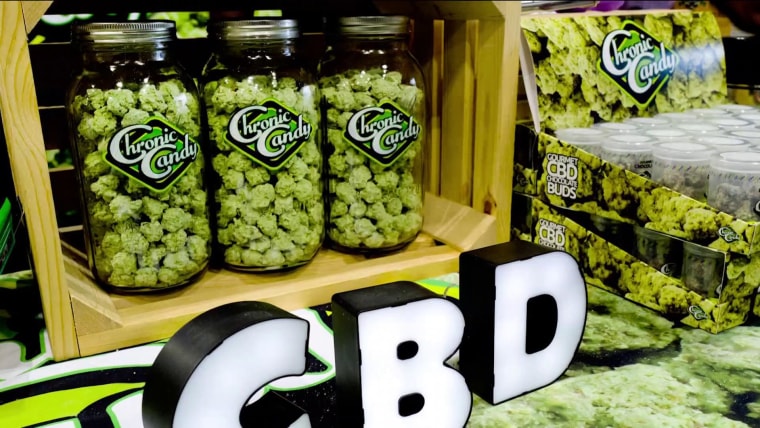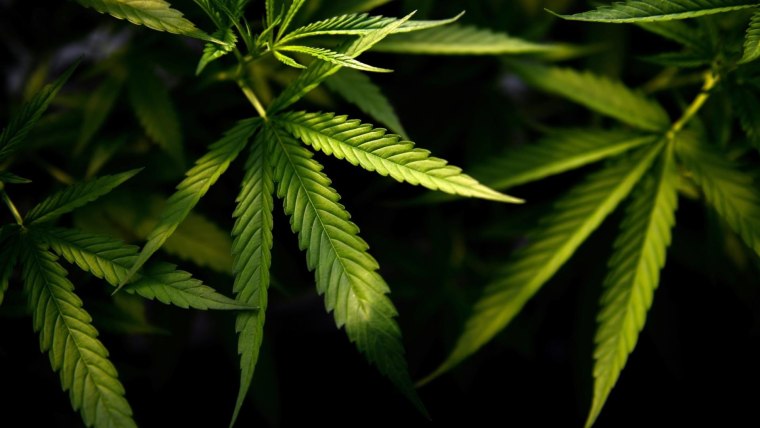Nickolas Jarosh started smoking marijuana after his shifts as a 911 dispatcher. He’d flip between working days and nights, and the inconsistent schedule made it difficult to fall asleep. Tetrahydrocannabinol, or THC, the psychoactive ingredient in marijuana, helped, he said.
Jarosh, 29, who now lives outside Houston, no longer works a job that forces him to keep inconsistent hours. He also no longer has access to marijuana, which he said had also been helping to ease his anxiety and depression.
But four months ago, he found a substitute: a federally legal form of the psychoactive compound called delta-8 THC. Now, he orders it from a company in Boston that works it into gummies, chocolates and vape cartridges.
“Delta-8 makes a huge difference in being able to relax, clear my mind and get to sleep. I wake up feeling more rested,” said Jarosh, who has also tried cannabidiol, or CBD, products, which he said help a little, but not enough.
“Switching to CBD products that also have delta-8 has made a huge difference. It’s not quite as potent as delta-9, but it’s very similar,” he said.
When people talk about THC, they’re typically talking about delta-9 THC. That’s the chemical responsible for the high associated with marijuana. But it’s not the only compound found in cannabis.
The cannabis plant contains more than 500 chemical compounds, including 100 cannabinoids, like CBD and various forms of THC.
Although some states have legalized marijuana for recreational or medicinal use, on a federal level, the plant remains listed as a Schedule I drug, a tier reserved for drugs with a high potential for abuse and no medicinal benefit, according to the Drug Enforcement Administration
However, the legality of the plant’s individual compounds, including delta-8 THC, falls into a gray area.
Thanks to a loophole in the 2018 farm bill, delta-8 THC is unregulated at the federal level. That legislation legalized hemp, which is defined as a cannabis plant that contains 0.3 percent delta-9 THC or less — levels considered too low to have a psychoactive effect. However, the bill does not address delta-8 THC levels, an omission that makes it legal for vendors to sell the compound, often as edibles, vape cartridges and tinctures, with no oversight.
But in recent months, 14 states — Alaska, Arizona, Arkansas, Colorado, Delaware, Idaho, Iowa, Kentucky, Mississippi, Montana, New York, Rhode Island, Vermont and Utah — have blocked the sale of delta-8, citing lack of research into the compound’s psychoactive effects. However, not all states see the compound as a health concern. A section that would have banned delta-8 in Texas was struck from a state bill in May, keeping delta-8 THC legal in Texas.
“We don’t know enough to be worried yet, but better to be safe than sorry,” said Daniele Piomelli, director of the University of California, Irvine, Center for the Study of Cannabis.
How is delta-8 THC different from delta-9 THC?
Both delta-8 and delta-9 THC are naturally found in cannabis, and chemically, the two compounds are very similar. All that separates them is the location of a double bond, found on the eighth carbon in delta-8 THC and the ninth carbon in delta-9.
As far as scientists know, all forms of THC bind to cannabinoid receptors in the body’s endocannabinoid system, which is what produces a high. However, due to the location of its double-bond, delta-8 binds to those receptors in a slightly different manner than delta-9 THC, making it less potent. Beyond that, scientists aren’t sure how the two compounds differ.
“No one has taken delta-8 and delta-9 and given them to healthy people and tracked the difference,” said Raphael Mechoulam, a professor of medicinal chemistry at Hebrew University of Jerusalem and the former president of the International Cannabinoid Research Society. “And even the effects of delta-9 depend greatly on the dose.”
Does delta-8 have medical benefits?
Delta-9 is the quintessential form of THC that has been the subject of clinical trials for everything from multiple sclerosis to memory retrieval. According to Piomelli, because delta-8 and delta-9 THC have such a similar molecular structure, the two compounds would theoretically produce similar medical benefits, but there isn’t any strong data to prove that is true.
“Very few people have taken pure delta-8 and reported it. People use it for a long list of ailments, but there are very few clinical trials,” Mechoulam said.
Clinical trials are the gold standard of medical research and so far, only one very small clinical trial has been conducted on delta-8 THC. In 1995, Mechoulam and his colleagues administered the compound to eight pediatric cancer patients two hours before each chemotherapy session. Over the course of eight months, none of these patients vomited following their cancer treatment, the study found. Newer research has also tested cannabis’ ability to curb nausea in cancer patients, with promising results, however, other chemicals in the cannabis plant may be at play.
According to Mechoulam, delta-8 THC is a more stable compound than the more well-studied delta-9. This could make delta-8 THC a better candidate than delta-9 THC for new therapeutics –– if future research shows it to be medically beneficial.
Should I be cautious of delta-8 THC products?
In short, yes. There is still very little known about delta-8 THC itself and in an unregulated market, products that contain the compound can easily be cut with toxic materials consumers have no way of knowing about.
Aside from delta-9 THC, there’s much less research on individual cannabinoids than there is on the cannabis plant as a whole.
When people smoke marijuana, for example, they inhale all of the compounds found in the plant. Delta-8 THC is just one of these compounds, and scientists don’t know much about how the isolated chemical works in the body, especially in high concentrations.
According to Piomelli, one of the reasons cannabis is generally considered nontoxic is because its complex mix of compounds forms a sort of checks and balances system. Although some plants are bred to contain higher amounts of THC, “there is only so much THC a plant can make,” he said.
Just because THC comes from a plant that doesn’t kill people doesn’t mean THC alone is safe. We don’t know that until we test it.
“But if you extract pure THC — whether delta-8 or delta-9 — and put it into dabs and all the other stuff we have now, you are doing something else, and you cannot assume the toxicity of pure THC is the same as the whole plant,” Piomelli said. “Just because THC comes from a plant that doesn’t kill people doesn’t mean THC alone is safe. We don’t know that until we test it.”
And just because delta-8 THC produces milder psychoactive effects than delta-9 THC doesn’t mean it’s always less intense, Piomelli said. “To circumvent potency is easy, you just use more.”
Unregulated potency isn’t the only issue experts are concerned with.
“It’s not delta-8 that’s dangerous, it’s what it could be mixed with in an unregulated market,” said Steven Hawkins, CEO of the U.S. Cannabis Council, a trade group that represents state-licensed cannabis companies and legalization advocates.
In a report published earlier this month, the council said the boom in unregulated delta-8 THC sales “presents a public health risk of potentially wider impact than the vape crisis.”
When the group used a private lab to test 16 delta-8 THC products purchased in California, Florida, Nevada, Texas, Michigan, Massachusetts, North Carolina and Indiana, all but one sample contained illicit delta-9 THC. A few also contained heavy metals.
Although the group works in favor of groups that would benefit financially from delta-8 THC becoming federally regulated, it isn’t alone in its safety concerns.
“Whenever you are looking at one of these derived compounds, you have to ask yourself how it was extracted from a plant,” Piomelli said.
Manufacturers extract THC using solvents including dichloromethane, which emits highly toxic fumes when exposed to heat. Particularly in an unregulated market, these chemicals can be left in products that are eaten, vaped or smoked — products which may already contain harmful compounds by themselves.
“In order for a compound to be administered, it has to be mixed with other compounds to be taken via mouth or inhaled. If you are taking an FDA-approved drug, all those chemicals are approved,” Piomelli said. “But if this operation is run in a lab somewhere else, you really don’t know what is happening.”
Follow NBC HEALTH on Twitter & Facebook.
"want" - Google News
June 28, 2021 at 07:10PM
https://ift.tt/3A5chtk
Delta-8 THC is legal in many states, but some want to ban it - NBC News
"want" - Google News
https://ift.tt/31yeVa2
https://ift.tt/2YsHiXz
Bagikan Berita Ini

















0 Response to "Delta-8 THC is legal in many states, but some want to ban it - NBC News"
Post a Comment